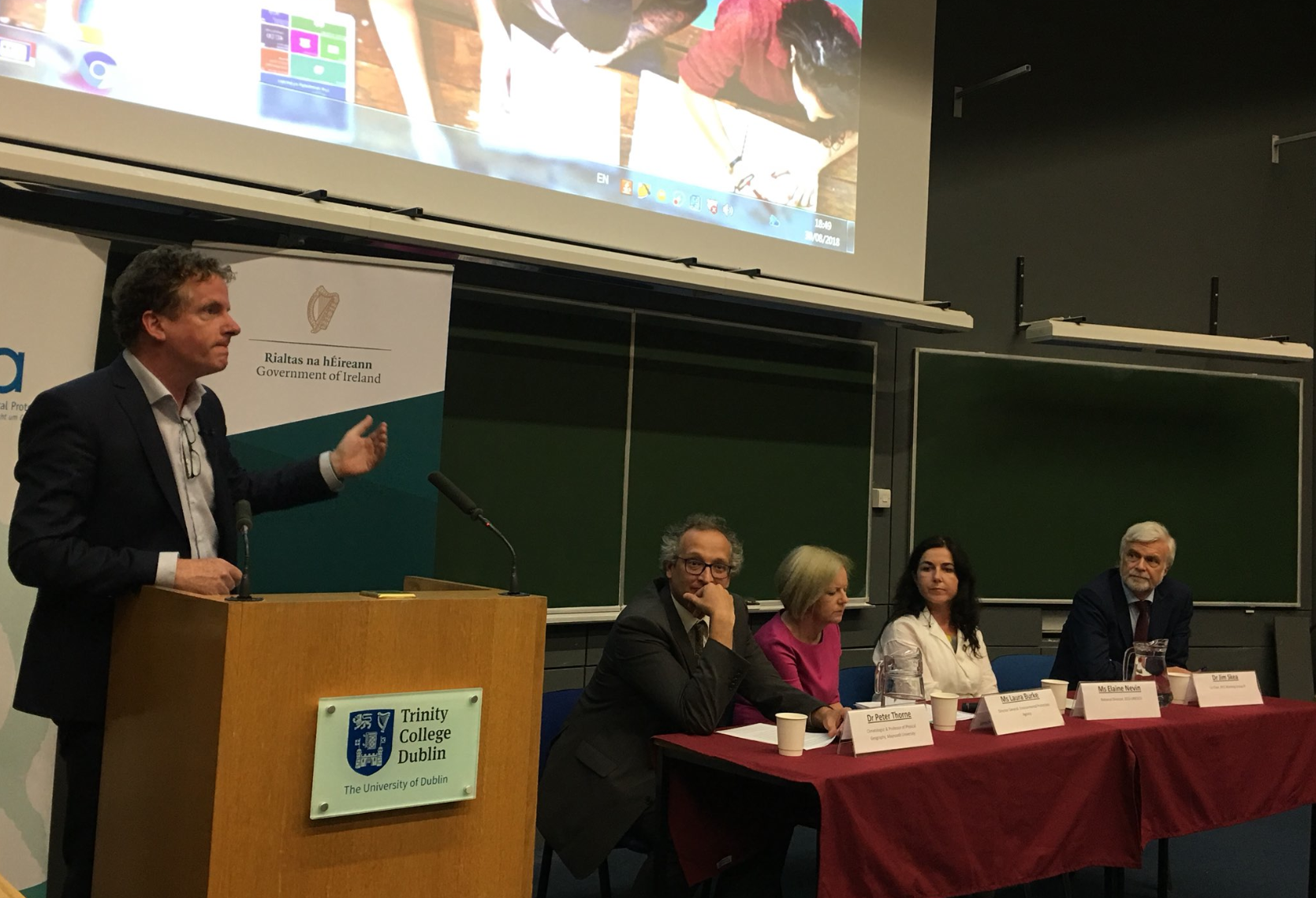
RTE’s Paul Cunningham moderated a panel of climate change experts, who discussed the need for cross-sectoral collaboration in battling climate change, the importance of accessible science communication and the impressive work of the IPCC, among other topics. Minister for Communications, Climate Action and Environment Denis Naughten was present, while the IPCC was represented by three of their most senior members: co-chairs Dr Jim Skea and and Dr Hoesung Lee, and Director of Irish Climate Analysis Dr Peter Thorne. Laura Burke, the director general of the EPA, and Dr Elaine Nevin, the national director of Eco-UNESCO also featured on the panel.
Although advertised as starting from 5.30pm, the event didn’t kick off until 6.15pm. Upon arriving at the reception, the use of non-reusable cups was evident, and paper supplementals were given out to the attendees, which was surprising given that the event was climate change-orientated. That being said, the event itself was informative and engaging.
Throughout the night, IPCC’s achievements, spanning the last 30 years, were acknowledged. Minister Naughten highlighted the IPCC’s influence over government policies; for example, the first IPCC assessment report served as the basis for the formation of the United Nations Framework Convention on Climate Change, while their most recent report became integral to the Paris Agreement of 2015.
The minister also highlighted the work that the European Union is doing for the environment, saying that one in five euro of the EU budget from 2014 to 2020 is spent on climate mitigation and adaptation, including the €22,000 allocated towards addressing Ireland’s transition to a low-carbon, climate-resilient society.
Dr Hoesung Lee, IPCC’s co-chair, thanked Ireland’s generosity to the organisation and highlighted the need for different fields to work together in the fight against climate change. One such field is social science; he believes it will play “a greater role in our upcoming work”. The IPCC’s upcoming assessment report is a testament to this, as it will be framed on the context of sustainable development and efforts to eradicate poverty and so, according to Dr Lee, there is a need to understand the values and motivations of different societies, a need which goes beyond science and technology.
Several panelists also called for a cross-sectoral collaboration in order to address climate change with regards to food production and emissions, food chains, food waste, the social aspects of mitigation, and the like. This call for the involvement of different areas of expertise was echoed throughout the night.
Dr Elaine Nevin of Eco-UNESCO acknowledged that there are challenges in communicating scientific data to policy makers. She argued that a way to combat this is to make the language used more accessible and more locally relevant. “Climate change is societal and covers a broad range of areas,” she said. Dr Nevin also called for better communication of proposed solutions to combat climate change. “We don’t want to instill fear,” she said, adding that “some hope and optimism” is important in tackling the issue.
Dr Peter Thorne and Dr Jim Skea, two IPCC representatives on the panel, were eager to discuss their organisation’s work. The improvements in climate technology over the last 30 years was Dr Thorne’s topic of choice, saying that the advancements allowed for better observations and an increase in the quality and range of data produced. He also stressed the now-famous phrasing of the conclusion of their most recent report: “Climate change is unequivocal and the human influence is clear.”
Meanwhile, Dr Jim Skea advised that there are two ways to address climate issues: to think about what one can do, and what one needs to do. Thinking about what one can do is more grounded in practicality, he said, but is only more useful in the short term. Meanwhile, thinking about what one needs to do is a much better way of addressing climate change in the long run, as it is a process that is better attuned to scientific data produced by the IPCC.
This is why the approved outline for their upcoming assessment report, to be published in 2021, features two timescales: one concerning mitigation pathways that are compatible with long-term goals, and another which covers mitigation and development pathways for the near future.
Climate change skeptics were evidently present last night, given some of the audience members’ questions. “Perhaps climate science has made a mistake,” one attendee stated, after asking if the IPCC recognises that data over the last five months “strongly indicates” that the net increase of mean global temperature has now ended and may have been caused by an El Niño. He was then interrupted by another member of the audience who pleaded with the panel to not address the skeptics so that we may “move forward.” “There are climate deniers in the audience, I can see them here,” he exclaimed.
This audience member need not have worried, however, as both IPCC representatives countered the question in a calm and grounded manner. The IPCC looks at the evidence gathered over decades before arriving at a conclusion, Dr Skea said, while Dr Thorne gave an analogy of a human walking a dog, in that there is much more variation in the path that the dog takes when compared to the human, but both of them are heading in the same trajectory. He stated that “El Niño cannot explain where we are” and emphasised that looking at the bigger picture when it comes to climate change is important.
Dr Lee closed the event by emphasising once again the need for people from all backgrounds and lines of work to come together so that not only the scientific community understands the data gathered by the IPCC, but the wider general public will also gain insights from it. Ultimately, the night delivered what moderator Paul Cunningham promised it will bring from the beginning: worthwhile conversations surrounding scientific facts, political action and public engagement.






